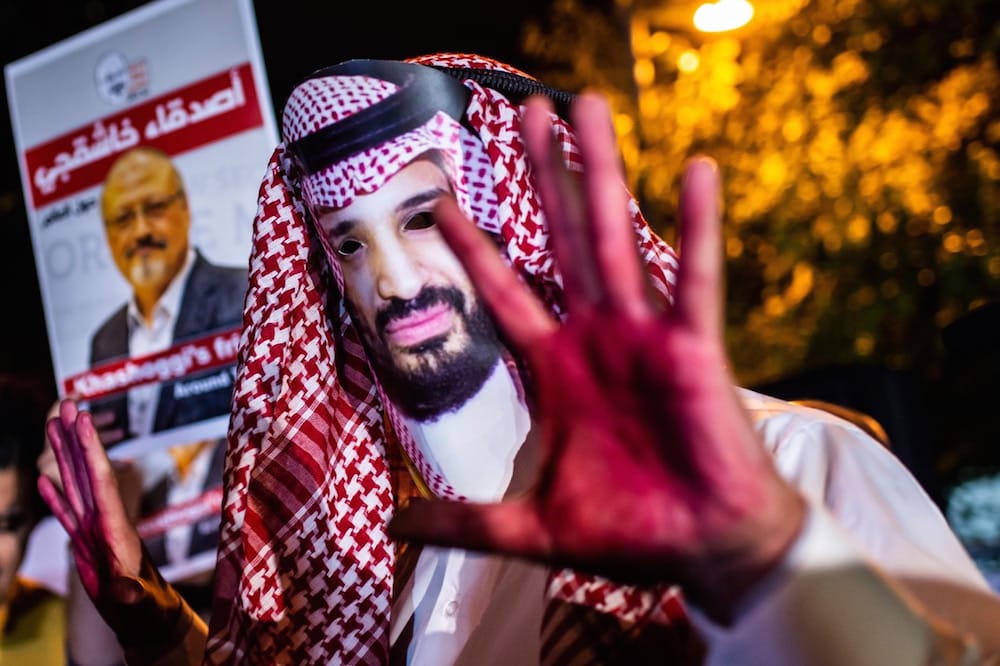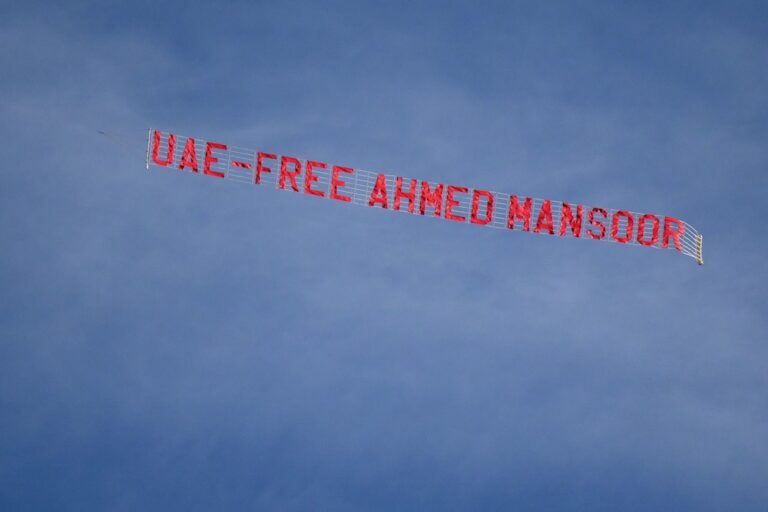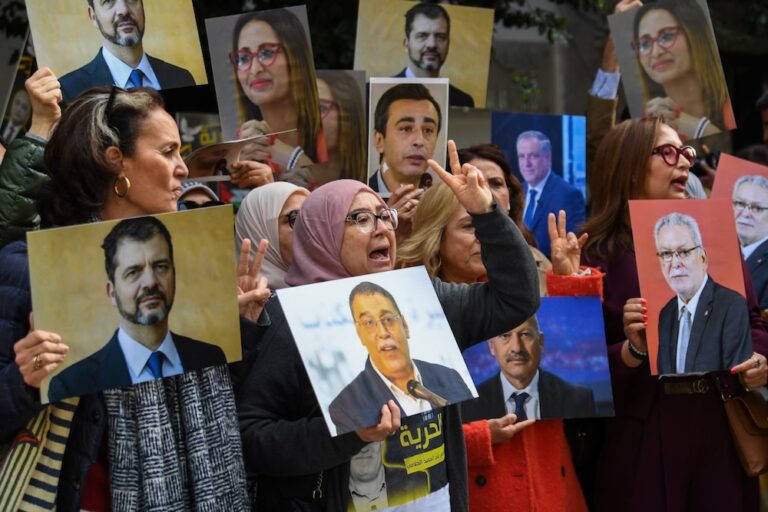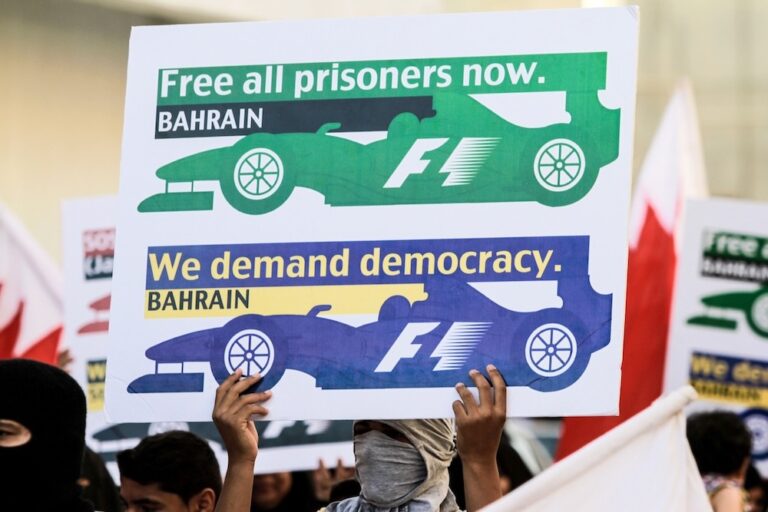February 2021 in Middle East and North Africa: A free expression roundup produced by IFEX's Regional Editor Naseem Tarawnah, based on IFEX member reports and news from the region.
Biden’s foreign policy sends mixed signals, and what justice forJamal Khashoggi looks like. Rights groups raise the alarm over abuses in Egypt’s women’s prison. Protesters continue to be targeted across the region, and a Syrian intelligence officer is sentenced in Germany for crimes against humanity.
After four years of enduring a US administration that has turned a blind eye to escalating human rights violations in the region, recent weeks saw renewed but short-lived hope of Washington’s new leadership. Spurred by President Biden’s campaign pledges “to defend and advance human rights and other democratic values” civil society in the region have been mobilizing to call for a shift in US foreign policy in the region.
The list of demands is long: from pressuring authoritarians to release the thousands of prisoners of conscience behind bars, to ending the era of impunity that has emboldened authoritarians to practice some of the most atrocious repressive tactics without facing any repercussions.
Case in point: Saudi Arabia.
Impunity, disinformation, and justice for Jamal
The Biden administration’s release of a declassified congressional report on the murder of journalist Jamal Khashoggi was met with criticism from the human rights community. The report confirmed Crown Prince Mohamed Bin Salman (MBS) approved the operation that ended in the brutal assassination of the prominent journalist. Its findings came as no shock, and validate UN Special Rapporteur Agnes Callamard’s 2019 report, which concluded Khashoggi was the victim of a “premeditated execution“ and found credible evidence of MBS’s involvement.
Following the congressional report’s release, the Biden administration imposed sanctions on 17 individuals under the Global Magnitsky sanctions program for their role in the crime, but stopped short of holding the crown prince accountable. Rights groups have been quick to warn that identifying MBS as culpable while granting him impunity would embolden oppressive acts and put lives at risk, and called for further steps to be taken to hold MBS personally accountable. Activists have also cautioned that sanctioning individuals would not be enough to end state repression.
“Jamal gave his life for our right to free speech. For his sake, we must keep freedom of expression at the top of the agenda,” wrote activist Iyad Baghdadi. “A good future that honours his vision isn’t one where MBS is sanctioned but still oppressive. A good future is one where MBS is internally checked by free Saudis who are able to demand accountability from their government.”
Despite Riyadh’s complete dismissal of the report, a Saudi-led online disinformation campaign emerged in its wake. Twitter took down roughly 3,500 fake accounts that demonstrated coordinated efforts to shape the public narrative for US audiences by pushing out pro-MBS messaging.
With the Biden administration signalling an unwillingness to hold MBS accountable for Khashoggi’s murder, rights groups have turned to the legal system. Reporters without Borders (RSF) filed a criminal complaint in Germany targeting MBS and other high-ranking Saudi officials for their role in Khashoggi’s murder and the continued imprisonment of 34 journalists, opening a criminal investigation that RSF Germany director Christian Mihr described as a “world first”.
Additionally, MBS also faces three separate lawsuits in US courts, including one filed by Khashoggi’s organisation Democracy for the Arab World Now (DAWN) and fiancé Hatice Cengiz, and another by Al Jazeera journalist Ghada Oueiss, who has been the target of a persistent online smear campaign.
Released; Not free
Activists and rights groups celebrated the release of Saudi women’s human rights activists Loujain Al-hathloul and Nouf Abdulaziz who had been detained since a 2018 crackdown on women’s rights defenders. Though released, Al-Hathloul and Abdulaziz are far from free. Constraints have been imposed on their right to travel and to express themselves. Human rights defender Essam Koshak and journalist Alaa Brinji, recently released after serving sentences for supporting women’s rights campaigning in the kingdom, also face travel bans.
“What these human rights defenders suffer is a tragedy in every sense of the word,” said Khalid Ibrahim of the Gulf Centre for Human Rights (GCHR). According to the rights group, released activists are monitored closely by the State Security Presidency, a security body focused on terrorism threats that is overseen by the king and has been used to persecute human rights defenders and journalists.
Since her release, Al-Hathloul, who is serving three years probation in addition to a five-year travel ban, began the fight to appeal the conditions of her release.
The releases have brought attention to the plight of numerous prisoners of conscience in Saudi jails, including Nassima Al-Sadaa, Samar Badawi and Mayaa al-Zahrani, spurring hope for their potential freedom. Prominent US-Saudi TV presenter Dr. Walid Fitaihi, imprisoned since 2017, saw his sentence and travel ban reduced, while three citizens who were arrested as minors and faced death sentences for participating in protests denouncing the 2016 execution of prominent Shi’ite cleric Nimr al-Nimr, in 2016, also saw their sentences reduced to 10 years’ imprisonment.
However, in the same week as Al-Hathloul’s release, woman human rights defender Israa Al-Ghomgham was sentenced to eight years in prison and a five year travel ban for her free expression. Meanwhile, imprisoned blogger Raif Badawi might be facing new charges, which rights groups say is a pretext to extend his 10-year sentence, now nearing its end.
Egypt’s ‘broken citizens’ languish in detention
“Imprisonment destroys people. Wrongful imprisonment is much worse.”
Al Jazeera journalist Mahmoud Hussein was conditionally released after more than four years in pre-trial detention. His release was welcome news in a month rife with human rights violations and continued demonstrations of President Sisi’s unchecked and oppressive rule.
Recent weeks saw journalist Gamaal el-Gamal forcibly disappeared and placed in pre-trial detention upon returning to Egypt from his home in Turkey, where he had spent the past five years in self-imposed exile. Researcher Ahmed Samir Santawy was also arrested, joining a rising number of detained academics.
Meanwhile, imprisoned journalist Solafa Magdy filed a complaint with authorities over assaults, including sexual assaults, she has faced in Al-Qanatar women’s prison since her arbitrary detention. The prison is also home to lawyer Mahienour al-Massry and journalist Esraa Abd El Fattah, who appeared with Magdy in court and described a wide range of abuses they have been subjected to, including bullying and being stripped of their personal belongings, including warm clothes and blankets.
The three women face horrible prison conditions that speak to the larger experience of the country’s 60,000 prisoners of conscience. This includes blogger Mohamed ‘Oxygen’, whose reported deteriorating health has raised alarms over whether authorities are deliberately trying to slowly kill him in prison.
At least 30,000 of those jailed for their free expression are stuck in an endless cycle of remand detention renewals that rights groups have repeatedly sounded the alarm about. This includes blogger and activist Alaa Abd El-Fattah who also appeared in court recently to lament his indefinite detention and request a trial.
“Imprisonment destroys people. Wrongful imprisonment is much worse,” Egyptian academic and novelist Ezzedine Fishere recently wrote. “Egypt can never move forward with tens of thousands of broken citizens and the rest living in fear.”
Economic anxieties fuel pandemic protests
As the pandemic rages on throughout the region, worsening economic realities continue to push protesters on to the streets to demand change and accountability, while security forces continue efforts to violently suppress demonstrations.
In Tunisia, with the country’s political factions at loggerheads, thousands of mostly young protesters have taken to the streets to voice their frustrations with the country’s economic inequalities, dysfunctional government, and repression from security forces. More than 1,600 protesters have been arrested since the protests launched in mid-January, with many facing targeted assaults by police officers. According to Human Rights Watch, activists from the LGBTQI+ community have been particularly targeted at protests, facing arbitrary arrests and physical assaults, as well as an online doxxing campaign “outing” activists.
In Iraq, anti-government protests continued to see targeted killings, with police forces shooting at protesters in Nasiriyah that left five dead. In a rare attempt to hold killers responsible for some 600 deaths since the protests launched in October 2019, Iraqi security forces arrested four individuals suspected of being part of a network responsible for the targeted assassinations of activists in Basra.
Five activists and journalists detained since August 2020 in the country’s Kurdistan region were sentenced to six years for participating in anti-government protests. Across the border, Iran’s security forces launched a wave of arbitrary arrests targeting Kurdish civil society activists.
In Algeria, dozens of pro-Hirak activists were released ahead of the country’s second anniversary of the popular anti-government protests. The amnesty included political activist Rachid Nekkaz, as well as prominent journalist Khalid Drareni, who was freed after almost a year in prison for his reporting of the protest movement. However, the move did little to keep protesters at bay, with thousands protesting despite pandemic restrictions. Rights groups reiterated their call for the international community to urge the Algerian government to put an end to policies aimed at silencing those exercising their right to free expression.
In Brief
In the UAE, Jordanian resident Ahmed Etoum was sentenced to ten years in prison for Facebook posts critical of Jordan. “UAE authorities have long clamped down on public criticism of UAE authorities and policies and have apparently extended this repression to critics of other countries as well,” said HRW deputy Middle East director, Michael Page. The case comes amidst the recent passing of Jordanian journalist Tayseer Al-Najjar, who – two years after his release from an Emirati prison – died of health complications contracted during his over-extended time there. Al-Najjar’s passing has drawn attention to the plight of at least 13 prisoners of conscience who remain jailed in unsanitary conditions despite serving their sentences.
In Lebanon, prominent political commentator and Hezbollah critic Loqman Slim was shot and killed in his car last month, spurring calls for an investigation into the shocking killing. Rights groups in the region say Slim’s assassination could have a: “chilling effect on the country amid a worrying series of measures that threaten free expression”, and an increasingly dangerous situation for journalists.
Noteworthy wins
Recent weeks have also seen some significant wins for civil society in the path towards justice. In Iraq, parliament passed the Yazidi Women Survivors Law, which formally recognized Daesh atrocities committed against the country’s ethnic minority, specifically the horrific sexual violence perpetuated on Yazidi women.
A court in Koblenz, Germany, sentenced a former Syrian intelligence officer to four and a half years’ imprisonment for committing crimes against humanity. Eyad al-Gharib was charged with arresting and torturing dozens of protesters on behalf of the Assad regime. The unprecedented verdict signified a rare moment of justice for countless victims and survivors, and a testament to the tireless work of activists and rights groups.
“The verdict issued today in the Court of Koblenz is not only an indictment of the accused. It is a judicial indictment of all the security services in Syria and of all the violations that they committed. And it’s just the beginning.” — Syria Center for Media and Freedom of Expression director, Mazen Darwish
Finally, the literary community mourned the passing of beloved Palestinian poet Mourid Barghouti who spent most of his life in exile, and whose widely-acclaimed work eloquently expressed the Palestinian diaspora experience.



